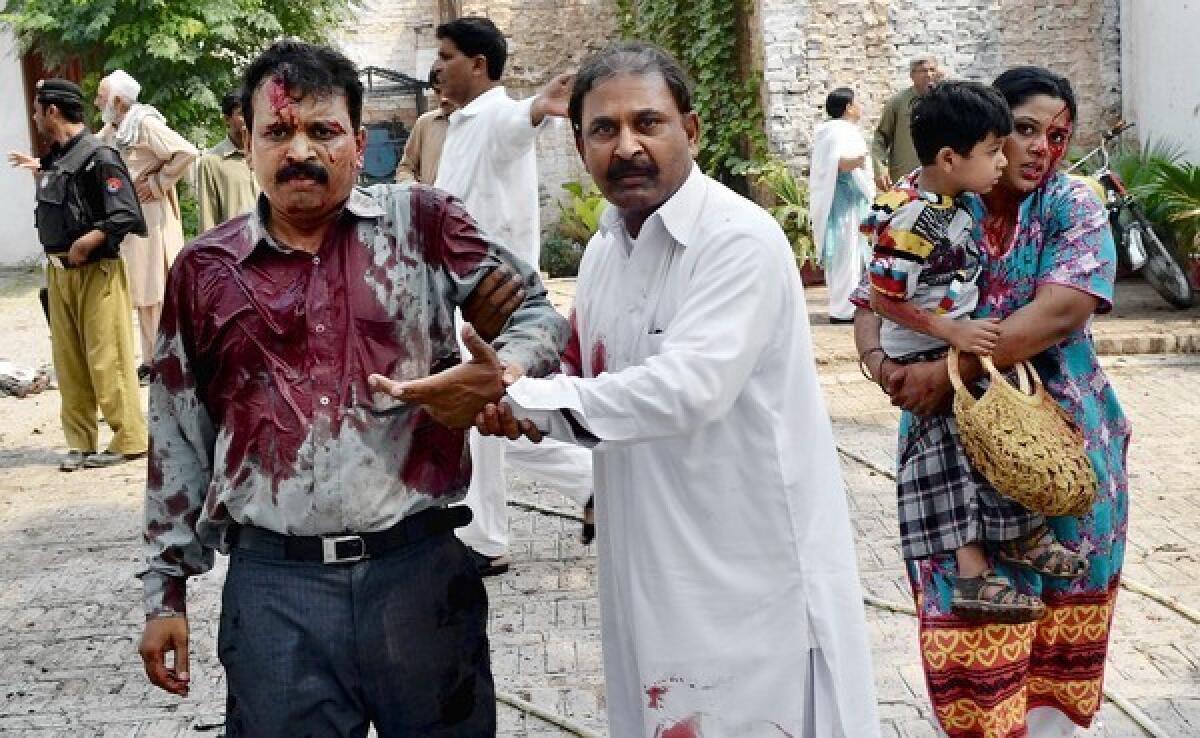Twin suicide blasts kill at least 75 at church in Pakistan

- Share via
PESHAWAR, Pakistan — Two suicide bombs exploded outside a crowded church in northwestern Pakistan just as Sunday services ended, killing at least 75 people and wounding more than 100, authorities said, in one of the nation’s worst attacks against Christians in years.
The dead and injured, including adult worshipers, children and police officers, overwhelmed the emergency ward of Peshawar’s Lady Reading Hospital, the city’s largest, where television footage showed hallways filled with corpses, badly wounded patients and women and children crying over the charred bodies of relatives. Many bodies were so badly damaged that they could not be easily identified, doctors said.
The official death toll was 75, but Al-Khidmat Foundation had packed 78 corpses into coffins by midafternoon, said Hameed Ullah, the charity group’s senior coordinator, and was scrambling to collect more coffins from around the city. “The death toll may rise,” said Zaheerul Islam, Peshawar’s deputy commissioner.
PHOTOS: Bombing at Pakistan church
No group immediately claimed responsibility for Sunday’s attack, but militant Islamist groups active in the area came under suspicion. Muhammad Ali, Peshawar’s chief of police, told reporters the attack was carried out by two suicide bombers. Generally at the end of Sunday services, he said, the 400 to 500 worshipers usually in attendance at All Saints Church of Pakistan, one of Peshawar’s oldest, are advised to break up into groups for their safety as they head out into the street.
“As they were dispersing in groups, a young male [suicide bomber] tried to attack one of the groups,” he said. “A police official on duty attempted to stop him, but he blew himself up. The second one was also a suicide blast. We have recovered the head of one of the bombers.”
Within hours of the attack in Peshawar, the capital of restive Khyber-Pakhtunkhwa province, protests by Christian groups erupted there and in other major cities across Pakistan, including Karachi, Islamabad and Quetta. Christians make up less than 3% of the country’s 193 million population.
Although Hindus, Sikhs, Christians, Sufi Muslims and other minorities have come under attack from Islamist militants throughout the country in recent years, Christians generally haven’t been targeted in Peshawar or other parts of the violence-racked province.
Television showed dozens of protesters in Peshawar blocking a main road, some waving sticks and hitting their chests and faces, as they burned tires and chanted, “We want peace” and “Death to terrorism.” Several hundred miles away in Karachi, more than 100 protesters blocked a main highway, holding placards that read, “Give us security” and “We want justice.”
Worshipers outside the church described an almost instantaneous transition from calm to carnage. “I was in the corridor of the church compound when the first explosion occurred, causing panic,” said Kamran Sadiq, a worshiper who suffered shrapnel injuries. His white shalwar kameez, the loose-fitting suit that is traditional in Pakistan, was stained with blood. He estimated that 350 people were in attendance at the time of the attack, although some placed it closer to 500.
Other worshipers, including church coordinator Hayat Bhati, criticized poor government security and what he described as an official policy of appeasing militants. Islamabad has released nearly three dozen Taliban members from prisons in recent weeks in a bid to bolster Afghan peace talks.
“The government is responsible for this bloodshed,” said John William, a priest with the Church of Pakistan helping the wounded in the hospital. “Instead of punishing militants, they are released from jails.”
Asked why police weren’t doing more to protect the public, police chief Ali told reporters his officers are also victims, with about 800 having died in recent militant attacks. “We are doing our best,” he added, “but how can we stop these suicide bombers?”
As Lady Reading Hospital became overwhelmed Sunday afternoon and blast victims were transferred to Khyber Teaching Hospital, the city’s second-largest health facility, frustrated relatives protested about the shortage of hospital facilities and poor response by doctors.
Catholic groups and the Khyber-Pakhtunkhwa government announced a three-day mourning period. Prime Minister Nawaz Sharif condemned the attack in Peshawar’s densely packed Kohati Gate district, a mixed residential and shopping neighborhood. “Terrorists have no religion, and targeting innocent people is against the teachings of Islam and all religions,” he said in a statement. “Such cruel acts of terrorism reflect the brutality and inhumane mind-set of the terrorists.”
Khyber-Pakhtunkhwa province, the site of numerous clashes between militants and Pakistani security forces, is a stronghold for Islamic extremists. A roadside bomb this month in the province killed a top Pakistani brigadier general just hours after officials announced plans to withdraw troops from the region and pursue peace talks with Taliban militants.
The Church of Pakistan, with which All Saints Church is affiliated, is an amalgam of various Protestant denominations that claims about half of the region’s Christians as members. Most of the rest are Catholic.
Sharif has outlined a nonconfrontational approach to Islamic militancy, calling for a peace deal with the largest group, the Taliban, that he sees as the best way to reduce violence. His approach was backed by the country’s major political parties, but the Taliban raised the stakes, calling for the release of militant prisoners and the removal of troops from the northwestern tribal region before it agrees to talk.
“What was our sin?” said one mourner at the hospital. “Why are we not safe inside our own church?”
Special correspondent Ali reported from Peshawar and Times staff writer Magnier reported from New Delhi. Special correspondent Nasr Khan in Islamabad contributed to this report.
More to Read
Sign up for Essential California
The most important California stories and recommendations in your inbox every morning.
You may occasionally receive promotional content from the Los Angeles Times.










